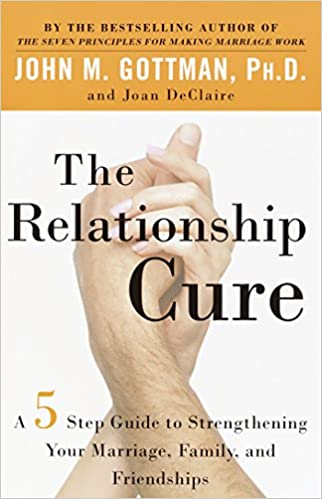The Relationship Cure — Book Summary
Introduction
The Relationship Cure is a guide for repairing and strengthening any sort of relationship, whether that is between a romantic partner, family member, friend, or a boss or colleague at work. Emphasizing the need for connection and communication in relationships, this book provides new tools and insights for how to resolve conflicts and foster the emotional connection that is so often lacking in everyday interactions. Dr. John Gottman introduces to his readers the fundamental unit of emotional connection, something he calls— the "emotional bid." Based on research, Dr. Gottman shows how the process of making and receiving successful bids by "turning toward" others is the key to a good relationship.
Interesting quotes from the book
I have seen this transformation happen among couples I've counseled as well as in my own life.
— John Gottman, The Relationship Cure
I also believe that most crabby people can change by making a conscious choice to react to the world in a different way. The key is to scan your environment regularly for things and people to appreciate rather than to criticize. In so doing, you create a new climate of praise and gratitude in your life. Instead of getting bogged down in people’s faults and mistakes, you get swept up in a fruitful search for reasons to say "thank you."
— John Gottman, The Relationship Cure
If you're in a relationship where there seems to be an inordinate amount of conflict, you may want to take a look at the issues that aren't being discussed.
— John Gottman, The Relationship Cure
Summary of the book The Relationship Cure
How we connect emotionally with others matters greatly. Often times we might lose interest in a conversation, think what we say won't make a difference, or feel that we aren't in a position to be able to say it, or misinterpret a situation by not understanding how the other person might be feeling. Regardless of the type of relationship or situation, being able to communicate emotional information is essential to feeling connected, heard, and supported. This is where the concept of the "emotional bid" plays an important role.
A bid is any attempt at receiving attention, affirmation, affection, or any other sort of positive connection with another person. They can range from subtle gestures such as a quick question, a look, or a comment, to the more complex and most intimate ways we communicate, like a request for advice or help. Basically any form of expression that carries the statement "I want to feel connected to you" is a bid.
How we choose to respond to a bid is key and the foundation of our emotional communication. There are three possible responses: we can turn toward, turn against, or turn away. To turn toward means we respond with meaningful connection. To turn against means we respond to the bid angrily and aggressively. Turning away means we ignore the bid altogether. Turning toward a bid naturally invites further bidding, whereas turning against or away leads to a repression of emotions and deters future bidding, eventually destroying a relationship.
The following are six mistakes, referred to as "bid busters," that people tend to make in a relationship when receiving a bid and what we can do to avoid them:
Mistake 1: Being Mindless Rather Than Mindful
Sometimes relationships fail because we simply don't pay enough attention to the emotional needs of others. It's not that we're purposefully trying to be mean, but sometimes we're just temporarily caught up in our own concerns that we aren't mindful to those around us. Simply put, if we don't pay attention, we don't connect. As a result, not only do others not feel supported by us, but we don't end up connecting or feeling supported by them either. By setting the goal to understand what others are feeling and being more mindful, we are able to notice the bids of others and respond to them. This is how connection and the formation of stable, meaningful relationships are made.
Mistake 2: Starting on a Sour Note
This bid buster is referred to as the "harsh startup." It occurs when you want to connect with someone and make a bid for that connection, but your bid begins in such a negative, blaming, or critical way that you end up driving the person away—the opposite of what you were actually seeking. Starting on a sour note like this can ruin perfectly valid bids for connection, leading to arguments and tension instead. Instead of using critical or negative language, begin with something positive, express appreciation and gratitude, replace "you" statements with "I" statements, or make sure to not begin by unloading complaints.
The following table is a list of examples provided in the book of harsh vs. soft startups:
|
Technique |
Don't start this way |
Start like this instead |
|
Begin with something positive: |
"We never have fun together anymore. Why don't we ever do anything adventurous?" |
"Look at this article about a couple who hiked the Pacific Crest Trail. It reminds me of how much fun it is to have adventures with you. Let's plan something now." |
|
Express appreciation and gratitude: |
"I never hear from anybody anymore. The only time the family contacts me is when somebody dies." |
"It was great to be invited to Uncle Henry's surprise party last year. I'd love to know when the family plans another get-together." |
|
Start with "I" instead of "You:" |
"You could have called. You made me stay up all night worrying about you." |
"I was so worried when you didn't call that it kept me up all night." |
|
Don't stockpile complaints: |
"I didn't want to say anything, but I can't take it anymore. You haven't asked for sex in over six months, and I feel like you don't love me anymore." |
"I like it when you make the first move, but it's been a while. Can we talk about it?" |
Mistake 3: Using Harmful Criticism Instead of Helpful Complaints
Conflict is inevitable in any relationship, but how you express your position in a conflict makes all the difference in your ability to connect with others. With that said, if you must complain, do so, but never criticize. The difference between a complaint and criticism is that a complaint focuses on a specific problem that address the person's behavior, but not one's perceived character defects. Criticism, on the other hand, is more judgmental and attacks the person's character, typically with negative labels and blame. To avoid this, state your needs without attacking or blaming the other person, describe your side as your perception and not as fact or the truth, and focus on specific behavior, not global judgments.
Mistake 4: Flooding
"Flooding" occurs when an individual becomes emotionally and physically overwhelmed by intense emotions that are triggered in a discussion of conflict. You are no longer able to think clearly, continue the conversation effectively, or send and receive bids for emotional connection. Sweaty hands, a pounding heart, and irregular or shallow breathing are all physical signs of flooding. Instead of being able to focus on what the other person is saying, your mind races with defensive thoughts and feel a need to flee the conversation. The best thing to do when you are feeling flooded is to take a break for at least twenty minutes (the amount of time it typically takes for the body to recover from emotional stress) before coming back to the discussion.
Mistake 5: Practicing a Crabby Habit of Mind
It's normal to feel irritable at times, but when you have what is referred to as a "crabby habit of mind," you tend to always feel irritable. Individuals with this habit constantly scan the world for evidence to justify their feelings, and often try to correct imperfect situations or get overly concerned with other people's shortcomings. Instead of turning toward other's emotional bids, these individuals tend to respond by turning against. By creating a habit of searching our environment for what we're grateful for or can appreciate instead, we can change the way we react and respond to others.
Mistake 6: Avoiding the Conversation You Need to Have
We often worry about whether it is something we said that made the other person upset, but more often than not it's the things we need to discuss but avoid doing so that harm our relationships. As a result, confusion arises, tension builds, and quarrels erupt, leading to hostility, defensiveness, and withdrawal. If you talk about the problem, you open the possibility of breaking down the barrier between you and prevent the issue and tension from getting worse. By self-disclosing how you feel and connecting, you can work on reaching a common understanding. Even if you don't reach a solution or compromise right away, at least you've established emotional connection and both individuals feel heard.
Essential Lessons learned from the book
Lesson 1: Emotional Connection is Essential in a Relationship
One of the greatest takeaways from this book is that if one remains open to expressing emotions and taking the time to understand the emotions of others, we can create deeper, more meaningful relationships in which we feel connected and supported.
Lesson 2: A Little Emotional Energy Goes a Long Way
Emotional energy, if used effectively and in a positive manner, has the power to assist someone in achieving one's goals and objectives in life, including having meaningful relationships. Emotional energy is all about bids management—how you manage emotional bids to connect with the people you interact with on a daily basis.
Lesson 3: How to Recognize and Respond to the Bids of Others
Learning how to be mindful to the emotional bids of others and how to respond by turning toward is the key to resolving conflict and improving connection in relationships.
Review of the book The Relationship Cure
The Relationship Cure brings forth valuable insights and revelations that would otherwise remain hidden. I can now approach a conversation with the understanding that expressing emotions are essential to make a meaningful connection, and I have learned several important techniques on how to meet the emotional needs of others.
I would recommend this book for anyone looking to improve their interpersonal skills at work or in their personal lives with family members, friends, or romantic partners.
Conclusion
Understanding how we relate to others and what it is that we are needing from each other is how we maintain a successful relationship. This book can help you change your perception about others and better understand why they behave or react the way they do. In addition, by applying the tools and insights learned in this book, you can repair, maintain, and improve relationships and your communication with others.
Don't miss the other book summaries on SunInMe.org

